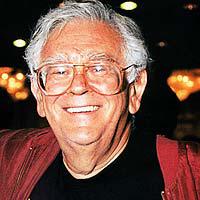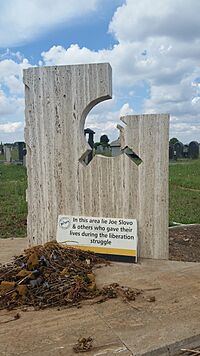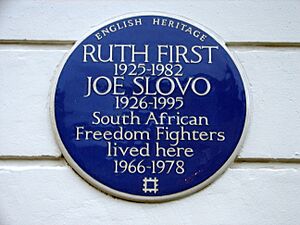Joe Slovo facts for kids
Quick facts for kids
Joe Slovo
|
|
|---|---|
 |
|
| Minister of Housing of South Africa | |
| In office April 1994 – January 1995 |
|
| President | Nelson Mandela |
| Preceded by | New post |
| National Executive Committee member of the African National Congress | |
| President | Nelson Mandela |
| General Secretary of the South African Communist Party | |
| In office 1984–1991 |
|
| Succeeded by | Chris Hani |
| Commander of uMkhonto we Sizwe | |
| President | Oliver Tambo |
| Preceded by | Nelson Mandela |
| Succeeded by | Chris Hani |
| Personal details | |
| Born |
Yossel Mashel Slovo
23 May 1926 Obeliai, Lithuania |
| Died | 6 January 1995 (aged 68) Johannesburg, South Africa |
| Political party | African National Congress South African Communist Party |
| Spouses |
Ruth First
(m. 1949; died 1982)Helena Dolny
(m. 1987) |
| Military service | |
| Allegiance | Union of South Africa African National Congress |
| Branch/service | South African Army uMkhonto we Sizwe |
| Years of service | 1941–1945 1963–1990 |
| Battles/wars | Second World War Internal resistance to apartheid Rhodesian Bush War Angolan Civil War South African Border War |
Joe Slovo (born Yossel Mashel Slovo; 23 May 1926 – 6 January 1995) was an important South African politician. He was a strong opponent of the apartheid system, which was a harsh system of racial separation.
Slovo was a long-time leader in the South African Communist Party (SACP) and a key member of the African National Congress (ANC). He also helped lead the ANC's military group, uMkhonto we Sizwe (MK).
He was part of the Congress of the People in June 1955, which created the Freedom Charter. This document outlined a vision for a free and fair South Africa. Slovo was jailed for six months in 1960. The next year, he became a leader of uMkhonto we Sizwe.
From 1963 to 1990, he lived outside South Africa, working against apartheid from other countries. When he returned in 1990, he helped with the talks that ended apartheid. He was known for suggesting "sunset clauses," which were agreements to help everyone during the change to a democratic government. He also strongly believed in a country where race didn't matter. After the 1994 elections, he became the Minister for Housing in Nelson Mandela's government. He passed away from cancer in 1995.
Contents
Early Life and Activism
Joe Slovo was born on 23 May 1926 in Obeliai, Lithuania. His family was Jewish and moved to South Africa when he was eight years old. His father worked as a truck driver in Johannesburg. Even though his family was religious, Joe Slovo became an atheist, but he still respected many parts of Jewish culture.
He went to King Edward VII School but left in 1941 to work as a clerk. He joined a workers' union and helped organize a strike.
Joining the Fight for Freedom
In 1942, Slovo joined the South African Communist Party. He was inspired by the fight against the Nazis in World War II. He volunteered to fight and served as a Signaler for South African forces in North Africa and Italy. When he came back to South Africa, he joined the Springbok Legion, a group of former soldiers who wanted a fair society for all races.
Between 1946 and 1950, he studied law at the University of the Witswatersrand. He was a student activist and was in the same class as Nelson Mandela. In 1949, he married Ruth First, who was also a strong activist against apartheid. They had three daughters: Shawn, Gillian, and Robyn. Sadly, Ruth First died in 1982 in Maputo.
Facing Apartheid Laws
In 1950, the SACP was made illegal. Both Joe Slovo and Ruth First were named as communists under a law called the Suppression of Communism Act. This meant they could not be quoted in public or attend public meetings.
Slovo became active in the South African Congress of Democrats, which worked with the ANC. He was part of the June 1955 Congress of the People near Johannesburg. This event brought together many groups to create the Freedom Charter.
He was arrested and held for two months during the Treason Trial in 1956, but the charges against him were dropped in 1958. He was arrested again for six months after the Sharpeville massacre in 1960, when a state of emergency was declared.
Leading the Military Wing
In 1961, Joe Slovo became one of the leaders of uMkhonto we Sizwe (MK). This was the military part of the ANC, formed by the ANC and SACP working together. In 1963, he had to leave South Africa and lived in Britain, Angola, Mozambique, and Zambia. As a chief of staff for MK, he helped plan its actions against the apartheid government.
In 1984, he was chosen as the general secretary of the SACP in Lusaka, Zambia. In 1985, he became the first white person to join the ANC's national executive committee.
Return and New South Africa
In May 1990, after 27 years away, Joe Slovo came back to South Africa. He took part in the first talks between the government and the ANC. He was not well, so he stepped down as SACP general secretary in 1991 and became the SACP chairperson. Chris Hani took over from him.
Joe Slovo had been seen as a very bad person by many white South Africans, with false stories spread about him. So, he received a lot of attention when he returned.
Negotiating for Change
In 1992, Slovo helped make a big step forward in the negotiations to end apartheid in South Africa. He suggested the "sunset clauses" that the ANC and SACP leaders had developed. These ideas included having a government with different parties working together for five years after democratic elections. They also offered guarantees for government workers and an amnesty process for past actions. These ideas were meant to prevent problems from groups who didn't want change. However, Slovo was firm that there should be full majority rule.
After the 1994 elections, Joe Slovo became the Minister for Housing in Nelson Mandela's government. He worked in this role until he passed away from cancer in 1995. His funeral was attended by many important leaders, including Nelson Mandela and Thabo Mbeki. He was buried in Avalon Cemetery, Soweto, which was unusual for a white South African. About 50,000 people, mostly black, came to his funeral.

Remembering Joe Slovo
In 2004, Joe Slovo was voted 47th in the Top 100 Great South Africans. Some informal settlements in Durban and Cape Town were named after him. Roads in Johannesburg and Durban were also renamed Joe Slovo Drive and Joe Slovo Street. A new building at Rhodes University in Grahamstown is named "Joe Slovo" in his honor.
The Congress of South African Trade Unions, a large group of workers' unions, holds an annual Joe Slovo Memorial Lecture. Joe Slovo was admired across southern Africa. A magazine from Zimbabwe called him a "liberation war hero" and an "African patriot" who was fully dedicated to the fight for black freedom.
In Movies
Joe Slovo appears as a character in two movies written by his daughter, Shawn Slovo. In the 1988 film A World Apart, he is shown as "Gus Roth" (played by Jeroen Krabbé). He is played by Malcolm Purkey in the 2006 film Catch A Fire.
See also
 In Spanish: Joe Slovo para niños
In Spanish: Joe Slovo para niños
 | Leon Lynch |
 | Milton P. Webster |
 | Ferdinand Smith |


